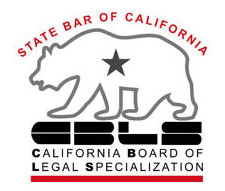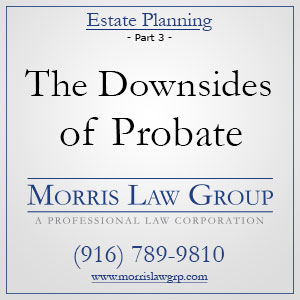The Downsides of Probate
Let’s talk for a minute about a few of the downsides of probate. First is pretty straightforward, probates are court proceedings and what that means is that they’re public. The statute says any interested person can go in and take a look at a probate file. So if a person passes away, and you’re wondering whether that person has a probate going on, you go down to the county where the person passed away and ask to see that probate file. They will give it to you. You can take a look at the person’s will you can take a look at the inventory and appraisal of assets. You can basically read through and figure out what that person had and where it’s going. A lot of people do that as an invasion of their privacy.
Call for a No-Cost Initial Consultation or Plan Review Today!
(916) 789-9810
The second major downside of probate is that probates, like most court proceedings, take a really long time. We do progress as part of our practice. We have a client come in and they had a parent pass away independent have a plan all the play all the parent has a will, we can take that a state through probate but we generally tell clients is that that is going to take somewhere between eight months and two years. That’s for an uncontested probate where everyone agrees where everything is going to go.
Most of that time is spent sitting around doing nothing. There are a whole bunch of statutory waiting periods in a probate. For example, typically when we file a probate petition, there’s usually about six weeks before we get a hearing once the hearing is held in the person has been appointed as the administrator or executor of the estate, then there’s a four-month waiting around with creditors to show up. During that time usually you can do your inventory appraisal do other things like that but it has to be approved, it has to be reviewed, and all of that stuff takes time.
The third major downside is probably the biggest mantra lot of people though and that’s the probe’s are very expensive. Probate fees are statutory, which are the fees are paid to the attorney and also paid the executor of the estate. If the executor chooses to take these, they are based on a percentage of the gross value of the estate. This starts at 4% of the first $100,000 of value, 3% of the seconds $100,000 of value and 2% of every $100,000 up to about $1.5 Million. After that a different formula is used.
For example, let’s say that you’ve got a house that needs to go through probate and the house is worth $300,000. To take that house through probate it’s going to cost you 4% + 3% + 2%, which translates to $9,000 in attorney’s fees. If there is an executor taking fees you can double the cost to $18,000, to have the probate court rubber-stamped a deed for you.
Overall, not a great deal for most people. An important thing to recognize about probate fees, is that they’re based on what’s called the gross value of the estate. This is the value of the estate not counting encumbrances like mortgages or other debt. So if you got a $300,000 house with a $280,000 mortgage you’re not going to be paying probate fees on the $20,000 of equity, you are going to be paying probate fees on the full $300,000 value. So sometimes you have situations where people come in, and by the time they sell the house and paid the Realtor and probate fees and everything else, they wind up underwater on the house. This means it doesn’t make sense to go through probate in that situation because it’s so expensive.
Our Locations
El Dorado Hills
5137 Golden Foothill Parkway, Ste. 110El Dorado Hills, CA 95762
(916)789-9810
drmorris@morrislawgrp.com
Sacramento
3626 Fair Oaks Blvd., Ste. 100Sacramento, CA 95864
(916)789-9810
drmorris@morrislawgrp.com
Communities Served
About Morris Law Group

Attorney David R. Morris is a Certified Specialist in Estates, Trusts, and Probate, certified by the State Bar of California. Certified Specialists undergo rigorous peer review, testing, and education to certify that they are experts in their subject matter areas. Fewer than two percent of attorneys in California become Certified Specialists in any area of law—the designation serves as an indication that the attorney is skilled, experienced, and knowledgeable in the specialty area.
With offices in Sacramento and El Dorado Hills, Morris Law Group provides innovative, cost effective solutions for clients seeking to resolve and avoid problems related to their families and livelihoods. We serve individuals and business clients in the communities of El Dorado Hills, Sacramento, West Sacramento, South Sacramento, Midtown Sacramento, Natomas, Folsom, Granite Bay, Rancho Cordova, Citrus Heights, Carmichael, Roseville, Cameron Park, Shingle Springs and Placerville.

